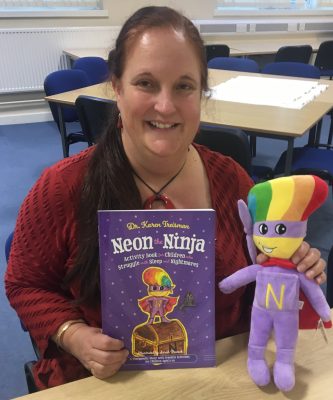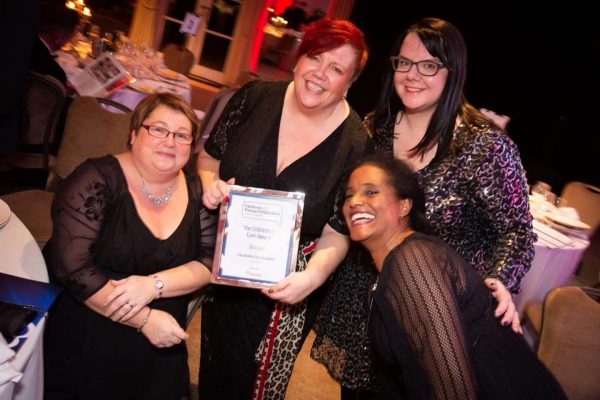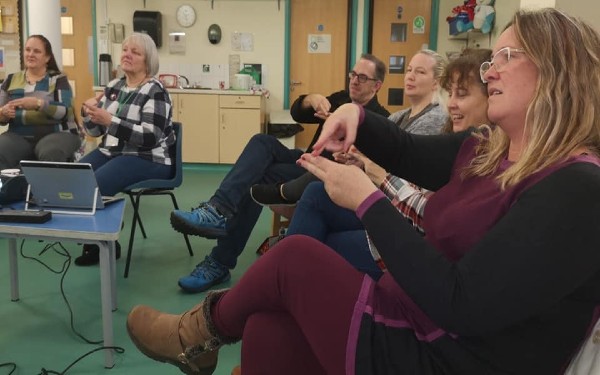There may be a view historically that fostering and children in care teams are the places that people go towards the end of their careers. But nothing could be further from the truth for social workers Emma-Jane and Macala. They joined the Lincolnshire County Council teams as newly qualified social workers four and three years ago respectively, and haven’t looked back since.
“When people think of fostering, they may see it as a place to go to wind down,” says Emma-Jane, a supervising social worker in the fostering recruitment team. “But that is not my experience. There are lots of opportunities to be creative, no two days are the same, and I get to support carers in making transformative changes to children’s lives.”
Lincolnshire has a high percentage of children placed with its own foster carers, for whom supporting local children is a strong motivator. Unlike other authorities that have front-end childcare teams that conduct both short and long-term care work, Lincolnshire has separated theirs out. “This allows us to focus on the outcomes of that work,” says Deborah Crawford, head of service in Lincolnshire, who has been a social worker in the county for 28 years and has a broad range of experience across children’s care teams.

A Lincolnshire foster carer is pictured leading and facilitating workshops to share knowledge and experience. © LCC.
Diversity of experience
“One of the aims of these teams [foster care and children in care teams] is to offer diversity of experience for social workers with the aim that, over subsequent years, they are able to learn, develop, and feel stimulated by their environments. Personally, that is why I have stayed in Lincolnshire, it has given me the opportunity to do that.”
Emma-Jane graduated from Lincoln University five years ago and secured a final placement in the fostering team.
“I had a fantastic practice supervisor and felt really supported with lots of shadowing opportunities for me to get stuck into with the job,” she says. “I was offered a position in the fostering team once I graduated and love my role because it is so varied. In previous jobs, when the work becomes too predictable, I would become disinterested. But with fostering, there are different areas of work, so I do not feel like I am losing the skills that I learnt in university.”
Emma-Jane’s role includes the recruitment and assessment of foster carers, undertaking annual reviews and supervising a number of fostering households in their role of caring for children.
Long-term relationships
One of the big appeals for Emma-Jane is that her role allows her to develop long-term relationships with foster carers and children. Macala, who works in one of Lincolnshire’s children in care teams, feels similarly about her role.
Macala, who graduated in 2018, works directly with children who have care plans of permanence and liaises closely with supervising social workers like Emma-Jane.
“I have longstanding relationships with both foster carers and children and when I pick up the phone, I can tell from the tone or how they are speaking, that something isn’t quite right,” she says. “That only comes through time and developing a relationship with them.”
Deborah says: “I think sometimes, we don’t see the benefits these long-term relationships have because we have to move on to the next challenge, but working in a long-term team allows you to acknowledge that success.
“While we predominantly work to support foster carers, we have to get to know the children in foster homes as well. And we need to have that wide range of communications to build long-term relationships.”
Community
Creating a space where these relationships can thrive has been enhanced by the introduction of Lincolnshire’s Caring2Learn programme four years ago.
The programme started out as a pilot project through the Partners in Practice government initiative, with social workers being invited to train alongside foster carers to improve educational outcomes for looked-after children and young people. Caring2Learn’s success means that the model has now been embedded within the fostering teams.

Lincolnshire County Council – Caring2Learn wins the child and young people award 2019 for outstanding contribution towards outcomes for children in care. © LCC.
The programme is modelled around trauma-informed practice and ties in with the solution-focused, relationship-building features found in the authority’s practice, model Signs of Safety. It has a hub support network that allows foster carers and other practitioners involved in the child’s care to seek peer support and share best practice as part of a community.
“Over 200 Lincolnshire’s foster carers – 97% – of are participating in the programme,” says Emma-Jane. “We work closely with foster carers, residential carers and school teachers – everyone involved in a child’s life – to create a supportive structure around them.
“This has led to a very strong and developed foster carer community with a strong online presence in which carers provide one another with support solutions as well as a bit of reassurance and fun.”
Public engagement
Engagement is predominantly though training events, WhatsApp and Facebook groups and meeting with foster carer champions.
“So if a carer needs to ask about supporting a child in home schooling for example, it creates an open discussion for people to share ideas on how best to manage the situation. Everybody’s experience is valued.”
For Macala, the Caring2Learn programme allows carers to build up confidence through the available training.
“I have seen carers grow in confidence through the programme and that has meant I have been able to step back my support but still be there in the background if they have any worries,” she says.
“One carer lacked in confidence so we got her on the Caring 2Learn programme and it has given her the confidence to learn that what she was doing was right. Through a merit system on the programme, she is also getting recognition for the work she is doing and that is developing her confidence even further. It gives me the opportunity to do creative work with foster carers like her, and I think that helps to build our relationship.”
Deborah says: “We are trying to be creative and engage in positive discourse to find the best ways of engaging with the foster care community. The Caring2Learn programme has made people re-think their individual roles and responsibilities in a positive way.”
Examples of how peer-to-peer support helps
Emma-Jane: “Some new foster carers were struggling with a young boy who was displaying some difficult behaviours after family time. The carers were concerned that seeing his mum and dad may be triggering past trauma. As a result, the carers got in touch with the ‘foster carer champions’ group to learn about their experiences when children have had similar struggles.
“Through sharing their experiences, the new foster carers were able to develop their understanding and receive some guidance. The outcome was that the right therapeutic support was identified for the young boy. The benefit for the carers was being able to recognise that trauma was being triggered and having other more experienced foster carers there meant the new carer was able to learn from their experiences and not feel alone.”
Macala: “Another child that we placed with foster carers was displaying challenging behaviours and was going through a turbulent journey with his task-centred foster carer. At that time, I was taking time to build up my relationship with the child and build that trust with him.
“I was working with the supervising social workers and the foster carers, pinpointing the child’s needs and identifying the right longer-term placement. He has now been in his placement for two years, feels settled and his carer is fantastic.”
Deborah: “The inception and development of the Caring2Learn approach in conjunction with the fostering service has led to the development of a stronger community ethos within the service and for foster carers. Peer support has helped carers to be solution focused and overcome challenges using the support and expertise of other foster carers.
“The strong community ethos and values see relationships being prioritised, and Caring2Learn couldn’t have been developed without the dedication and commitment of the social workers in the service. Teams have fostered a positive and inclusive environment where foster carers are encouraged to work in partnership as an equal member of the team for consistent and joined up care for children and young people.”
If you’re interested in finding out more about working at Lincolnshire children’s services, check out their employer profile, and read more articles from the teams here.




 Facebook
Facebook X
X LinkedIn
LinkedIn Instagram
Instagram